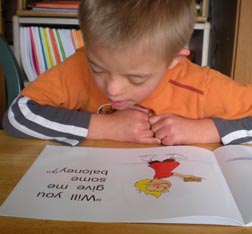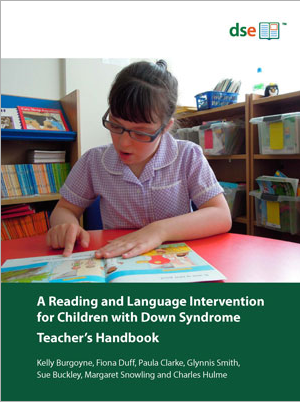I DIDN’T LEARN TO READ WITH PHONICS; WHY DOES MY CHILD with DS HAVE TO?
Awesome (and arguable) question. I’ll begin my answer with a history lesson:
Historically, insisting on phonics training as the primary means to learning to read is only a sometime-phenomena, and definitely a recent phenomena. Some generations (mine included) in the US and other English-speaking countries never came close enough to phonics to smell it. We learned to read just fine, of course.
How did we learn? By sight. I routinely ask my workshop audiences, “How many of you learned to read by phonics?” The percentage is always under 5%, and often lower (2 out of 55 people at my last workshop.)
Once we’d read “Run, Dick, run” a bazillion times, we recognized it instantly. We learned with the “Dick and Jane” series here in the US, and the United Kingdom had their own “Peter and Jane” series. (“Me Tarzan, you Jane.” Was Jane an uber-traveler, or what?)
Let Glenn Doman & a Foreign Student Weigh In
I love this clarifying quote from Glen Doman (How to Teach Your Baby to Read): “Reading is a brain function; spelling is a set of rules.” To expand on that a bit, phonics is a set of rules.
To make matters worse, the English language is full of undecodable words that simply have to be learned by sight. Consider: rein and rain; knew, through, trough…the list is long. And don’t forget about know and no.
My daughter Becca teaches ESL (English as a Second Language) to adults from all over the globe. Recently, she was coaching a young man from far, far away. She showed him no and said, “This is pronounced ‘no’.” Then she showed him know and said, “This is also pronounced ‘no’.” He looked at her dumbfounded and said, “You kidding me, right?”
 Do Our Children with Down Syndrome Need Phonics?
Do Our Children with Down Syndrome Need Phonics?
Maybe. Maybe not. Based on observation and experience, I believe the answer to the phonics question is 5-fold:
- There is a wide spectrum of cognitive needs and abilities among children with Down syndrome; where is the child on this spectrum? How easily will phonetic concepts be grasped? Will phonics help? Or frustrate?
- Some will learn to read quite well by sight, and will not need phonics, just as the typical child—historically, in education—did not need it to learn to read. My son Jonathan (DS, 30) was one of those, and I have personally known of others.
- Some will need a minimal training in phonics, such as beginning-middle-ending sounds in CVC words (Consonant-Vowel-Consonant).
- Some will struggle and need more extensive training in phonics to help them over the hurdles, but that training must be modified to meet the cognitive level of the child.
- Best practice is to simply meet the needs of the child.
 Is There a Teaching Situation in Which Phonics Should Always be Included?
Is There a Teaching Situation in Which Phonics Should Always be Included?
Probably. If an educator has the luxury of 45 minutes a day in which a child can be taught 1-on-1 in a pull-out situation (which fabulously enhances focus and concentration), then yes. The best plan for that type of schedule is to follow the RLI (Reading and Language Intervention) system of Downs Ed International, which is designed for 45 minutes daily.
But my 5-part answer above still holds, the bottom line being #5: meet the needs of the child.
Teach to the Sweet Spot
As a friend of mine says, “Teach to the sweet spot. A batter knows where the sweet spot on the bat is; a golfer knows where that sweet spot is on his clubs. We find the sweet spot in a child’s receptivity, and teach to that sweet spot.” This friend is a special ed teacher and Dad to a child with Down syndrome + autism, and like me, he seeks out that sweet spot, that doorway into a child’s understanding and receptivity. If phonics fits into your child’s sweet spot, enter. But enter with wisdom!

This is one of the best post I’ve read on teaching reading and how phonics are creating more trouble for special needs parents. A lot of parents make their children go through hell when they try their children with special needs to learn phonics. The truth is, I never learnt to read through phonics and I guess I am doing fairly well. I don’t want to make my girl go through this whole maze of rules!
Thanks for writing!